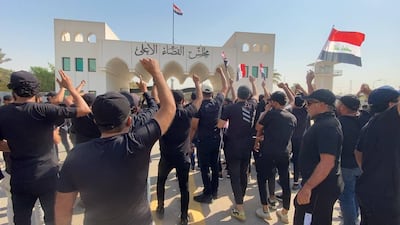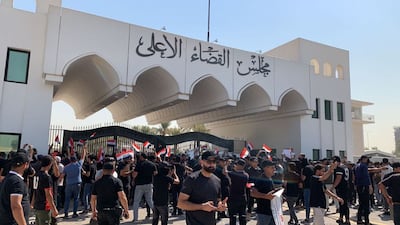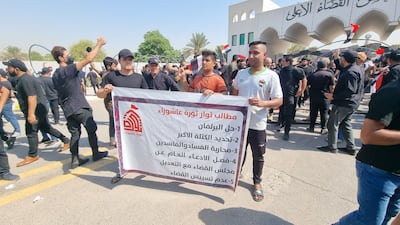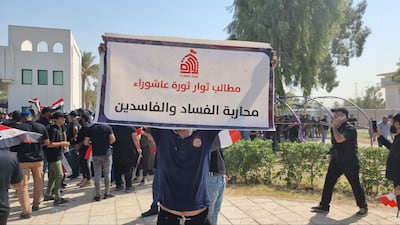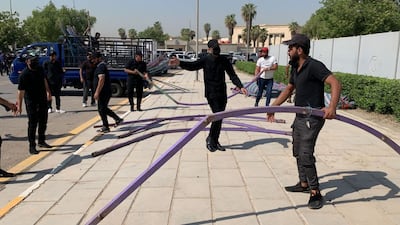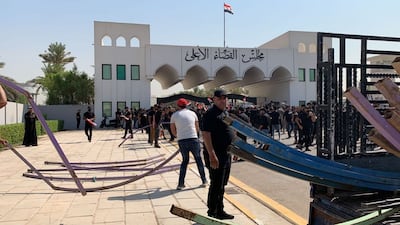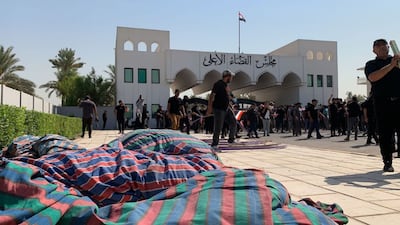Supporters of Iraq's powerful Shiite cleric Moqtada Al Sadr set up tents outside the Supreme Judiciary Council in Baghdad's Green Zone on Tuesday, in an escalation of the 10-month political impasse over the formation of a new government.
Protesters clad in black held Iraqi flags and shouted pro-Al Sadr slogans as pick-up trucks brought tents outside the main gate.
One banner read: “Our key demand is to dissolve parliament and to fight corruption and the corrupt.”
Later in the evening, the protesters withdrew to nearby locations following a request from Mr Al Sadr sent to them via an aide.
In response to the protests, the council announced the suspension of its activities and closed down courts across the country, in a further escalation of the situation.
But following the withdrawal of protesters, the council said it would resume normal operations on Wednesday.
The spat is taking a toll on ordinary Iraqis caught in the middle as their country is gripped by mounting challenges.
The turn of events prompted Prime Minister Mustafa Al Kadhimi to fly back home from an official visit to Egypt, where he was due to take part in a summit of Arab leaders including the UAE's President Sheikh Mohamed, Egypt's President Abdel Fattah El Sisi, Bahrain's King Hamad and Jordan's King Abdullah II.
A statement from his office said he had to cut the visit short “in light of the developments of current events in the country, and for the direct follow-up to the performance of the duties of the security forces in protecting the institutions of the judiciary and the state”.
Meanwhile, a Baghdad court issued arrest warrants for three Sadrist leaders, Mohammed Al Saiedi, Sabah Al Saiedi and Ghaieb Al Omairi, on the grounds of “threatening the judiciary”. The men have been posting statements on social media and giving interviews on media outlets against the judiciary.
Mr Al Kadhimi warned that disrupting the work of the judiciary “exposes the country to serious risks”.
Iraqi President Barham Salih said the country “is going through a critical situation” and needs to “to protect the peaceful democratic path”.
Both pleaded for calm and dialogue.
Iraq held early elections in October last year in response to one of the core demands of a nationwide, pro-reform protest movement that began in 2019 in central and southern parts of the country.
The elections marked the fifth parliamentary vote for a full-term government since the 2003 US-led invasion that toppled Saddam Hussein.
Since then, bitter rivalry among political elites, mainly among the country’s majority Shiites, has delayed the process of forming a government.
As tension runs high between opposing political blocs, there are fears that the country could slide into intra-sectarian strife.
For weeks, Mr Al Sadr's followers have been protesting outside the parliament building, demanding the dissolution of the legislative body and the holding of snap elections.
They stayed away from the Supreme Judiciary Council building to avoid criticism.
Mr Al Sadr's Iran-backed rival, the Co-ordination Framework, is seeking a leading role in forming government.
Mr Al Sadr has demanded that the country's judiciary dissolve parliament by the end of last week and set a date for early elections, or face unspecific consequences.
But the Supreme Judiciary Council rejected the request, saying it had no power to do so.
The country’s constitution requires a vote passed by an absolute majority to dissolve parliament and that vote can only be requested by a third of legislators, or by the prime minister, with the president's approval.
However, Mr Al Sadr said his calls for judicial action were justified because the constitutional deadlines for the appointment of a new president and prime minister had been missed after last year's elections.
He asked his supporters to file lawsuits over the issue with the Supreme Federal Court.
Shortly after, dozens of his followers set up their tents. The Supreme Judiciary Council and the Supreme Federal Court held a meeting and denounced the encampment as “unconstitutional” and “against the law”.
The protest is meant to “pressure the Supreme Federal Court to issue a ruling to dissolve the Council of Representatives”, a statement from the duo read, adding that the bodies have received threats by text message.
“The government and the political party behind the protest will be held responsible legally for consequences of this action,” the statement said.
Widespread criticism
Mr Al Sadr's latest move has drawn widespread criticism.
Parliamentary Speaker Mohammed Al Halbousi described the development as a “setback as a result of impeding the constitutional institutions”.
“We have all to refer to the constitution and to be fit to the responsibility to get the country out of this stifling crisis,” he said, cautioning that the move could affect the legitimacy of the existing system.
The UN mission to Iraq, known as Unami, stressed in a statement that the “right to peaceful protest is an essential element of democracy”, but “equally important is the assertion of constitutional compliance and respect for state institutions”.
“State institutions must operate unimpeded in service of the Iraqi people, including the SJC [Supreme Judiciary Council],” it said.
The Iraqi Bar Association announced the suspension of its activities to support the Supreme Judiciary Council, calling on all political rivals to refer to the constitution.
“All political parties must realise how dangerous it is not protecting the independence of the judiciary. That could lead us to lose the most important pillar in building a constitutional state,” it said in a statement.
'Erroneous political process'
The political stalemate is the longest since the 2003 US-led invasion that toppled Saddam Hussein.
It has delayed approving this year's federal budget, hindered efforts to improve public services and halted plans to create jobs and face mounting challenges such as climate change.
On Monday, bishops of the Chaldean Catholic Church around the world called on Iraqi politicians to quickly form the new government and to overhaul the “erroneous” political process.
“We appeal to you to make the interest of the country, the unity of its territory, its sovereignty and security a priority as well as serving the citizens who are tired from the accumulated crises,” they said in a statement.
“We call upon you to rise over the personal and political interests to form a national government capable to do a thorough reform to the erroneous political process,” it added.
“What we fear most is that the crisis will continue and the country will slip, God forbid, to the unfortunate results,” they warned.
The appeal came during the annual Synod for the Chaldean bishops from around the world who gathered at the patriarchal headquarters in Baghdad. It is meant to discuss important events and challenges facing the Chaldean Church at home and abroad.
